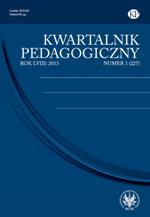Neuronauka w muzyce
Neuroscience in music
Author(s): Ewa A. ZwolińskaSubject(s): Social Sciences
Published by: Wydawnictwa Uniwersytetu Warszawskiego
Keywords: neuroscience; brain, mind; audiation; musical language; neurolinguistics; linguistics; linguistic communication disorders; amusia; aphasia; the influence of environment; neuroimaging
Summary/Abstract: Neuroscience a term translated as “neurobiology” or “neurology” is dedicated to interdisciplinary science dealing with the research of the nervous system, and cognitive neuroscience is a discipline in search for the answer to the question of how the brain creates the mind. Knowledge about brain functioning related with facts about creation of the mind is of major importance for linguistic communication, and is very interesting for representatives of many sciences – speech therapists, neurophysiologists, doctors, linguistics, philosophers, music psychologists and music educators. In music, the need to communicate is closely related to audiation, which is the ability to hear and make sense of what we want to communicate (express) vocally or instrumentally and it is a mental processing of tonal and rhythmic material. Music education based on audiation can analyze individual attributes of thinking and behaviour of students. Music language development has conducive neurobiological and neuroanatomical conditions in the first years of life, and therefore the great importance of early music education is emphasized. We should be aware that shortage of proper music interactions in early childhood is the reason of innate musical ability and potential diminution and causes irreversible effects on development in this area. Contemporary research on the brain is important for the human music development, including the research on music thinking development, music timbre preferences or music skills.
Journal: Kwartalnik Pedagogiczny
- Issue Year: 227/2013
- Issue No: 1
- Page Range: 51-78
- Page Count: 28
- Language: Polish
- Content File-PDF

